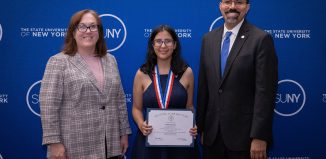Making Democracy Work: Judicial reform is needed in New York
By Lisa Scott
Americans (remember civics?) know that there is a third branch of government … the Judiciary. Unfortunately, most think of Judge Judy (and the myriad of similar TV judges) and Law and Order (and its spinoffs). If they are politically engaged, it’s the Supreme Court that is a focus. However, judges affect the majority of Americans much “closer to home” at some point in their lives: traffic, matrimonial, drug and alcohol, accidents, property. But there’s so little awareness of how judges are selected and the pressing need for court reform in New York State.
Because of the League of Women Voters’ nonpartisan principles and expertise with voter education, I was asked by County Executive Steve Bellone to moderate a four-hour judicial reform conference on June 8. Opening keynotes from Congressman Jerry Nadler (Chairman of the House Judiciary Committee) and Hon. Jeh Johnson (former U.S. Dept of Homeland Security Secretary, appointed Special Advisor on Equal Justice in the Courts by Chief Judge Janet DiFiore in 2020) set the stage for the three panels.
These focused on the history and experience of judicial selection; a robust discussion of judicial selection reform proposals, and a wide-ranging discussion of the challenges: court simplification, promoting diversity on the bench, and criminal justice and public confidence in state judiciary as well as methods to promote and ensure judicial independence and implications on criminal justice. (View the entire conference at https://www.facebook.com/SteveBellone/videos).
During the conference, Hon. Stuart Namm, former Suffolk County Judge, was given the Suffolk County Public Service Award by CE Bellone. Judge Namm’s experience culminating in 1985 with a letter to then-Gov. Mario Cuomo describing misconduct by the Suffolk County police and the district attorney’s office including possible perjury by prosecutors.
New York’s State Commission of Investigation followed up on Judge Namm’s charges, eventually filing a report (described as “blistering” by Newsday) condemning misconduct by police detectives and prosecutors. The Suffolk County police commissioner resigned soon afterward; the district attorney declined to run for re-election. A number of officers retired early or resigned. No one, however, was indicted. Denied renomination to his judgeship, Judge Namm was ostracized and moved to North Carolina.
Although “some who knew him wished he would stay quiet,” Namm’s 2014 “A Whistleblower’s Lament” details his experiences. He said “… in New York state, judges always have to be looking over their shoulders. So long as judges in trial courts are selected through the political process, things will never change.”
The LWV of NYS has been advocating for court reform since 1955, when there were about 1500 autonomous courts in the state. Some progress has been made since then, but there has been tremendous reluctance by the NYS Assembly and Senate and the Governor to fully address issues via legislation and appropriate budget support. Constitutional amendments are needed. We support measures to obtain a unified, statewide court system, and believe judges should be chosen on the bases of merit although with ultimate control of a major governmental institution resting with the people.
New York’s existing multiple court structure creates confusion for the people the justice system is supposed to serve. For many, and frequently in matters involving the safety of families and children, the scenario is this: different judges decide on different pieces of inter-related cases, as a result each judge has an incomplete story of a case causing individuals to receive multiple decisions and faulty resolution of their cases. As a result, all parties to a case have to make multiple appearances, along with any government agencies, attorneys and witnesses and have to repeat, again and again, the trauma that caused them to appear in court.
This not only wastes time for everyone, it is completely unfair and an unproductive way to provide justice, causes the loss of work and wages and perpetuates a system that is difficult, if not impossible, to understand, and hurts individuals and their families as they get caught up in systemic chaos. (To learn more, visit https://simplifynycourts.org/)
Lisa Scott is president of the League of Women Voters of Suffolk County, a nonprofit, nonpartisan organization that encourages the informed and active participation of citizens in government and influences public policy through education and advocacy. For more information, visit www.lwv-suffolkcounty.org, email [email protected] or call 631-862-6860.







